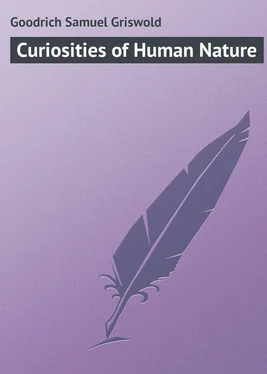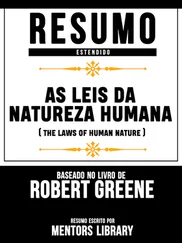Samuel Goodrich - Curiosities of Human Nature
Здесь есть возможность читать онлайн «Samuel Goodrich - Curiosities of Human Nature» — ознакомительный отрывок электронной книги совершенно бесплатно, а после прочтения отрывка купить полную версию. В некоторых случаях можно слушать аудио, скачать через торрент в формате fb2 и присутствует краткое содержание. Жанр: foreign_prose, на английском языке. Описание произведения, (предисловие) а так же отзывы посетителей доступны на портале библиотеки ЛибКат.
- Название:Curiosities of Human Nature
- Автор:
- Жанр:
- Год:неизвестен
- ISBN:нет данных
- Рейтинг книги:3 / 5. Голосов: 1
-
Избранное:Добавить в избранное
- Отзывы:
-
Ваша оценка:
- 60
- 1
- 2
- 3
- 4
- 5
Curiosities of Human Nature: краткое содержание, описание и аннотация
Предлагаем к чтению аннотацию, описание, краткое содержание или предисловие (зависит от того, что написал сам автор книги «Curiosities of Human Nature»). Если вы не нашли необходимую информацию о книге — напишите в комментариях, мы постараемся отыскать её.
Curiosities of Human Nature — читать онлайн ознакомительный отрывок
Ниже представлен текст книги, разбитый по страницам. Система сохранения места последней прочитанной страницы, позволяет с удобством читать онлайн бесплатно книгу «Curiosities of Human Nature», без необходимости каждый раз заново искать на чём Вы остановились. Поставьте закладку, и сможете в любой момент перейти на страницу, на которой закончили чтение.
Интервал:
Закладка:
While here he displayed a decided taste for mechanical and philosophical inventions; and avoiding the society of other children, provided himself with a collection of saws, hammers, and other instruments, with which he constructed models of many kinds of machinery. He also made hour-glasses, acting by the descent of water. A new windmill, of a peculiar construction, having been erected in the town, he studied it until he succeeded in imitating it, and placed a mouse inside, which he called the miller.
Some knowledge of drawing being necessary in these operations, he applied himself, without a master, to the study; and the walls of his room were covered with all sorts of designs. After a short period, however, his mother took him home, for the purpose of employing him on the farm and about the affairs of the house. She sent him several times to market, at Grantham, with the produce of the farm. A trusty servant was sent with him, and the young philosopher left him to manage the business, while he himself employed his time in reading. A sundial, which he constructed on the wall of the house at Woolsthorpe, is still shown. His irresistible passion for study and science finally induced his mother to send him back to Grantham. Here he continued for a time, and was entered at Trinity College, Cambridge, 1660.
At the latter place he studied mathematics with the utmost assiduity. In 1667, he obtained a fellowship; in 1669, the mathematical professorship; and in 1671, he became a member of the Royal Society. It was during his abode at Cambridge that he made his three great discoveries, of fluxions, the nature of light and colors, and the laws of gravitation. To the latter of these his attention was first turned by his seeing an apple fall from a tree. The Principia, which unfolded to the world the theory of the universe, was not published till 1687. In that year also Newton was chosen one of the delegates to defend the privileges of the university against James II.; and in 1688 and 1701 he was elected one of the members of the university. He was appointed warden of the mint in 1696; he was made master of it in 1699; was chosen president of the Royal Society in 1703; and was knighted in 1705. He died March 20, 1727.
His "Observations on the Prophecies of Daniel and the Apocalypse" appeared in 1733, in quarto. "It is astonishing," says Dr. Hutton, "what care and industry Newton employed about the papers relating to chronology, church history, &c.; as, on examining them, it appears that many are copies over and over again, often with little or no variation." All the works of this eminent philosopher were published by Dr. Samuel Horsley, in 1779, in five volumes, quarto; and an English translation of his "Philosophæ Naturalis Principia Mathematicæ," is extant.
The character of this great man has been thus drawn by Mr. Hume, in his history of England. "In Newton, Britain may boast of having produced the greatest and rarest genius that ever rose for the ornament and instruction of the human species. Cautious in admitting no principles but such as were founded on experiment, but resolute to adopt every such principle, however new or unusual; from modesty, ignorant of his superiority over the rest of mankind, and thence less careful to accommodate such reasonings to common apprehensions; more anxious to merit than acquire fame: – he was from these causes long unknown to the world; but his reputation at last broke out with a lustre, which scarcely any writer, during his own lifetime, had ever before attained. While Newton seemed to draw off the veil from some of the mysteries of nature, he showed at the same time some of the imperfections of the mechanical philosophy; and thereby restored her ultimate secrets to that obscurity in which they ever did and ever will remain."
The remains of Sir Isaac Newton were interred in Westminster Abbey, where a magnificent monument is erected to his memory, with a Latin inscription, concluding thus: – "Let mortals congratulate themselves that so great an ornament of human nature has existed." His character is shown, by Dr. Brewster, to have been that of the humble and sincere Christian. Of nature, antiquity, and the Holy Scriptures, he was a diligent, sagacious, and faithful interpreter. He maintained by his philosophy the dignity of the Supreme Being, and in his manners he exhibited the simplicity of the Gospel. "I seem to myself," he said, "to be like a child, picking up a shell here and there on the shore of the great ocean of truth." He would hardly admit that he had a genius above other men, but attributed his discoveries to the intentness with which he applied to the study of philosophy. We cannot better close our notice of this great man, than in the words of Pope:
"Nature and nature's laws lay hid in night —
God said, 'let Newton be' – and all was light!"
MAGLIABECCHI
Antony Magliabecchi was born at Florence, on the 29th of October, in the year 1633. His parents were so poor as to be well satisfied when they got him into the service of a man who sold greens. He had not yet learned to read, but he was perpetually poring over the leaves of old books, that were used as waste paper in his master's shop. A bookseller who lived in the neighborhood, observed this, and knowing that the boy could not read, asked him one day what he meant by staring so much at pieces of printed paper? He said, that he did not know how it was, but that he loved it of all things; that he was very uneasy in the business he was in, and should be the happiest creature in the world if he could live with him, who had always so many books about him.
The bookseller was pleased with this answer; and at last told him, that if his master were willing to part with him, he would take him. Young Magliabecchi was highly delighted, and the more so, when his master, agreeably to the bookseller's desire, gave him leave to go. He went, therefore, directly to his new business. He had not long been there, before he could find out any book that was asked for, as readily as the bookseller himself. In a short period he had learned to read, and then he was always reading when he could find time.
He seems never to have applied himself to any particular study. A love of reading was his ruling passion, and a prodigious memory his great talent. He read all kinds of books, almost indifferently, as they came into his hands, and that with a surprising quickness; yet he retained not only the sense, but often the words and the very manner of spelling.
His extraordinary application and talents soon recommended him to Ermina, librarian to the Cardinal de Medicis, and Marmi, the Grand Duke's librarian. He was by them introduced to the conversation of the learned, and made known at court. He now began to be looked upon everywhere as a prodigy, particularly for his unbounded memory.
In order to make an experiment in respect to this, a gentleman of Florence, who had written a piece, which was to be printed, lent the manuscript to Magliabecchi. Sometime after it had been returned, he came to the librarian with a melancholy face, and told him that by some accident he had lost his manuscript; and seemed almost inconsolable, entreating Magliabecchi, at the same time, to endeavor to recollect as much of it as he possibly could, and write it down. Magliabecchi assured him he would do so, and on setting about it, wrote down the whole, without missing a word.
By treasuring up everything he read, in this wonderful manner, or at least the subject, and all the principal parts of the books he ran over, his head became at last, as one of his acquaintance expressed it, "an universal index, both of titles and matter."
By this time, Magliabecchi was grown so famous for the vast extent of his reading, and his amazing retention of what he had read, that it began to grow common amongst the learned to consult him when they were writing on any subject. Thus, for instance, if a priest was going to compose a panegyric upon any favorite saint, and came to communicate his design to Magliabecchi, he would immediately tell him who had said anything of that saint, and in what part of their works, and that, sometimes, to the number of above a hundred authors. He would tell them not only who had treated of their subject designedly, but of such, also, as had touched upon it incidentally, in writing on other subjects. All this he did with the greatest exactness, naming the author, the book, the words, and often the very number of the page in which the passage referred to was inserted. He did this so often, so readily, and so exactly, that he came at last to be looked upon almost as an oracle, for the ready and full answers that he gave to all questions proposed to him in respect to any subject or science whatever.
Читать дальшеИнтервал:
Закладка:
Похожие книги на «Curiosities of Human Nature»
Представляем Вашему вниманию похожие книги на «Curiosities of Human Nature» списком для выбора. Мы отобрали схожую по названию и смыслу литературу в надежде предоставить читателям больше вариантов отыскать новые, интересные, ещё непрочитанные произведения.
Обсуждение, отзывы о книге «Curiosities of Human Nature» и просто собственные мнения читателей. Оставьте ваши комментарии, напишите, что Вы думаете о произведении, его смысле или главных героях. Укажите что конкретно понравилось, а что нет, и почему Вы так считаете.












